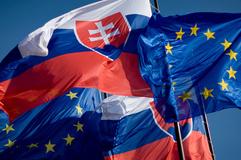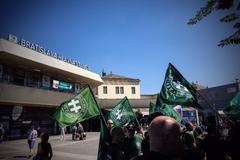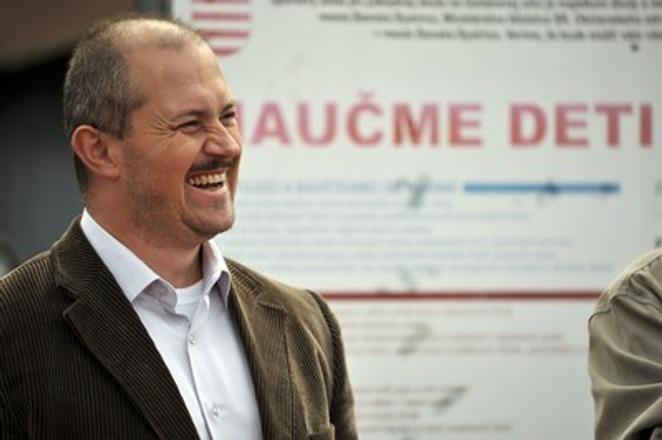There are three major candidates who will face the extremist that will run as incumbent for the post of the Banská Bystrica regional governor. Voters will most likely not think strategically and support the candidate that they will find the most sympathetic, even if his chances to be elected are low.
"People do not think strategically, even if they have the information from an opinion poll that clearly shows their candidate has no chance to win, they usually do not change their mind about the vote," says Pavol Baboš from the school of political sciences of Comenius University in Bratislava.
This stems from the results of an experiment conducted on some hundred students of the Faculty of Philosophy of Comenius University that was made by its Centre for Territorial and International Studies.
The experiment
People are randomly divided into two groups, so that all outside influences, like demographic or economic factors, are the same in both groups. One of the groups gets a certain stimulus, the other one does not. In election experiments the stimulus could be a simulated situation with polling rooms, ballot boxes, or ballots. The results of the experiment can be generalised for the entire population.
In practice, this means that in a one-round election in the Banská Bystrica region, where Marian Kotleba of the far-right ĽSNS is the regional governor, his chances to be re-elected are higher if two of his three challengers do not make an agreement to the benefit of the third one.
The three main challengers in the election that is to take place in autumn are director of the Museum of the Slovak National Uprising Stanislav Mičev, Freedom and Solidarity (SNS) MP Martin Klus, and Ján Lunter, the owner of a company that produces vegetarian products.
Kotleba's chances to win are high regardless of the number of challengers. The experiment conducted on 102 university students has shown that the hidden support for extremists is even higher than their preferences in polls.
In the latest survey of the Focus polling agency in late April, ĽSNS polled at 10.1 percent. If the results of the experiment are correct, the upper limit the extremists could reach is around 28-34 percent, according to Baboš. They could achieve such results if they continue calling for Slovakia's exit from the EU and NATO—the only party on the Slovak political scene doing so.
NATO is controlled by Jews, students conspire
In the 2016 parliamentary elections, ĽSNS got the most votes among voters aged 18-29, based on the findings of Focus. Most of them were students, menial workers, and self-employed. The support could also have been thanks to the billboards with Kotleba stating that "it is high time to leave the EU".
The experiment at the Faculty of Philosophy has shown that this agenda is what appeals to them the most about Kotleba.
"It's safe to say that the idea of leaving the EU and NATO really attracts some 20-30 percent of students in general," Baboš says and gives their tendency to believe conspiracy theories as one reason for that.
"The EU is damaging our agriculture, Brussels is dictating us everything, the NATO is controlled by Jews who want to gain power over the whole world," Baboš lists the myths that influence people's attitude to the country's membership in international communities.

Other parts of the citizenry feel negatively about the current development in Slovakia and Baboš believes they automatically link it to Slovakia's membership in the EU and NATO.
If Kotleba continues with his radical attitudes to the EU and NATO and will not have a competitor, the political analyst believes his chances to garner even more supporters will be higher.
Polomka mayor: It's no good
The sympathies of young people to the activities and the programme of extremists have also been confirmed by a recent study of the Institute for Public Affairs. More than one third of Slovakia's youth likes their style of politics, and they score much higher among people aged 18-29 than people in their thirties. The study, however, also states that they are mostly people from smaller towns of up to 20,000 inhabitants, with lower education and lower income.
ĽSNS has the strongest support in the Banská Bystrica region, the study revealed. It is a region with one of the highest unemployment rates and a higher rate of Roma people in the population. The anti-Roma agenda is what appeals to students the most, alongside the foreign policy stances, Baboš noted.
Polomka, the biggest village in the Horehronie region near Banská Bystrica, is the village where most people voted for Kotleba in the election of the regional governor four years ago. He got almost 82 percent of the vote in the village. Polomka, like the villages around it, has a problem with high unemployment.
"It's no good, nothing is being solved," the mayor of the village, Ján Lihan, says when asked if Kotleba has a chance to be re-elected this year.

He says the people of Polomka voted for him because he was the only one to name the problems that politicians have been neglecting for years. Those problems include the high unemployment rate, but also disorder in the village and social allowances.
Another village in the region, Valkovňa, elected as their mayor a Roma, Rudolf Pokoš, who ran for the ruling Smer party. He says that the young people in his village did not vote for Kotleba so much in the regional election.
"Most of the young people here are Roma, they are rather afraid of him," Pokoš explained.
When he asked the non-Roma why they voted for the extremist, they usually argued that he was going to "put things in order". The mayor does not agree.
"They wanted a change, but I do not see any, the situation only got worse," he says.
©Sme
Author: Lucia Krbatova


 BBSK regional governor Marian Kotleba (source: SITA)
BBSK regional governor Marian Kotleba (source: SITA)